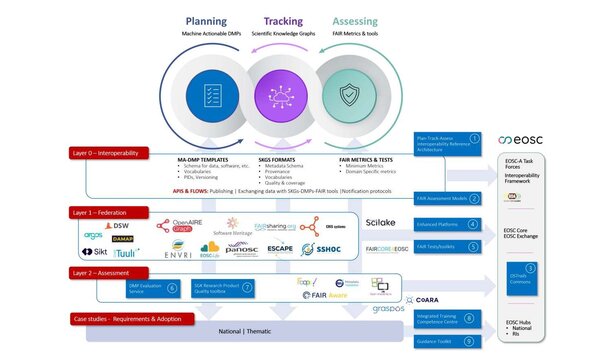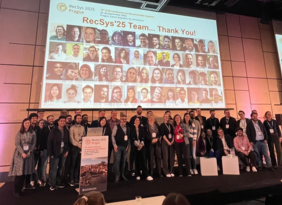
The aim of the OSTrails project is to improve the planning, monitoring, and evaluation of scientific knowledge beyond existing methods and to support pan-European collaboration to enhance tools and connect their key components for research and innovation. The project is coordinated by OpenAIRE, which provides an open scientific communication infrastructure to support European research. It engages key players in the field of data management planning, FAIR assessment tools, and knowledge graphs from across Europe.
Scientists from FIT CTU are involved in one of the key aspects of data management—planning—with the goal of simplifying and automating the entire process through machine processing of researchers' plans. They are working on increasing the level of automation and connecting individual tools in the system so that the result of planning is not just a formal document for funding providers, but a truly usable and machine-actionable Data Management Plan (DMP). This automation will not only speed up the work but also allow researchers to focus more on the research itself and less on technical and administrative matters.
“It is truly an honor for our team to be part of this significant project and to have the opportunity to advance this issue by leaps and bounds, both in terms of standardization and technical solutions, as well as adapting them to Czech conditions and their subsequent use,” states Associate Professor Robert Pergl, Ph.D., project leader at FIT CTU. “In the project, we are also collaborating with our national grant agencies GAČR and TAČR, which, like other agencies in Europe, support the publication of research data in accordance with FAIR principles. For them, this is often administratively and professionally challenging, but this is precisely where we can provide significant help,” he adds.
As part of a pilot project in the Czech Republic, FIT CTU is collaborating with partners such as the CESNET association, the National Technical Library (NTK), and grant agencies GAČR and TAČR. These institutions aim to support researchers in ensuring that their research data comply with FAIR principles (Findability, Accessibility, Interoperability, and Reusability). In practice, this means that the tools developed within the project will allow researchers and grant agencies to reduce administrative burdens and simplify data handling—from storage to further use in research. A part of the pilot project will also take place directly at CTU. In the DSpace system, designed for storing publications and other outputs of the university, project outputs will enable verification of compliance with FAIR principles, particularly the quality of all necessary metadata in accordance with recommendations. This process will support the FAIR quality of outputs from CTU.
The team of researchers at FIT CTU, led by Associate Professor Robert Pergl, has been actively developing the advanced open-source tool Data Stewardship Wizard (DSW) for over six years, which helps researchers meticulously plan data management. This tool also includes an important educational aspect, guiding researchers through various areas of data management and emphasizing the use of existing standards and other recommendations, such as FAIR principles and Open Science. DSW is part of a federation of interconnected tools within the OSTrails project.
Marek Suchánek, Ph.D., head of the FIT CTU Normalized Systems Labratory, states: “The OSTrails project is key for building the EOSC, as it utilizes various existing tools used across Europe and focuses on their appropriate integration. As a result, these (and potentially other future) tools will be able to effectively exchange information and collectively provide value to scientists, data stewards, research institutions, and grant agencies, which will no longer have to manually enter and manage often the same data in multiple places. Practical applicability will be tested through various thematic and national pilot implementations. Furthermore, this project has a reach beyond Europe thanks to its close ties with the international organization Research Data Alliance (RDA) and its interest and working groups. Thus, for DSW, this is a crucial involvement, especially considering our leading role in one of the project’s work packages.”





